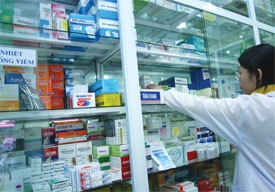State clamps down on pricing violations
 |
| The government's pricing registration scheme is designed to protect consumers from arbitrary price rises |
State agencies plan to call time on hikes in milk and drug prices by tightening controls on price declarations for these vital products.
Nguyen Anh Tuan, vice head of the Ministry of Finance (MoF)’s Price Management Department, said the ministry was working with its Financial Inspectorate and the General Department of Customs to gather data on the prices of milk materials and finished milk products. The data are then used to determine whether enterprises’ registered prices were reasonable.
In a similar move, the Ministry of Health’s Drug Administration of Vietnam late last month stopped issuing medicine registration numbers and import licenses to 10 enterprises violating rules on drug price declarations.
Drugs and dairy products for children under six are two of 17 items subject to price registration under MoF’s Circular 122/2010/TT-BTC on price stabilisation.
Importers and distributors listed in the circular must register and report their prices to the MoF’s Price Management Department when they launch new products or if there are price fluctuations.
In fact, many enterprises registered their prices much higher than their post-registration selling prices. In such a way, they could avoid possible intervention from the MoF in cases where they raised the prices since the new prices would still be lower than the registered prices.
Hanoi Department of Health chief inspector Nguyen Viet Cuong said poor patients were suffering after 20 pharmaceutical companies in northern Vietnam announced price rises of 3 to 30 per cent on 240 items.
“Many businesses were found to have increased drug prices, but escaped fines because 70 per cent of their medicine items were sold at the prices which were not higher than the registered ones,” Cuong said.
Following the central bank’s VND-USD exchange rate hike of 9 per cent early March, prices for imported milk have risen by 5-17 per cent.
A price management official of a northern province, who declined to be named, said that input costs only accounted for about 50 per cent of the final price for milk with other costs being for management, distribution, advertisement and promotion.
“Thus, the exchange rate adjustment of 9 per cent should raise the selling milk prices by only 4.5 per cent. Together with other changes in costs, the increase level should stay at around 5- 7 per cent instead of current over-inflated levels,” he said.
Vu Quoc Tuan, public relations manager of Nestle Vietnam, said the current regulations allowed enterprises to increase prices two days after announcing their intention to do so as long as there was no feedback from the MoF.
Tuan of MoF, in response, said that his department had found signs of enterprises registering too high prices. “These enterprises’ names have not been announced. However, if we discover any violations, we will require these enterprises to reduce their declaration prices in line with the regulations,” Tuan said.
Tackling the recent hike in drug prices, Minister of Health Nguyen Quoc Trieu in early March ordered relevant agencies to check the prices across the country. The Drug Administration of Vietnam then established three inspection teams to monitor prices of pharmaceutical companies, importers, wholesalers and retail stores.
These teams found that five of 10 companies inspected had declared unreasonable prices and had not reduced their declared prices in line with the administration’s requirements by March 10.
What the stars mean:
★ Poor ★ ★ Promising ★★★ Good ★★★★ Very good ★★★★★ Exceptional
 Tag:
Tag:
Related Contents
Latest News
More News
- Foreign fruits flood Vietnamese market (December 09, 2025 | 13:22)
- Vietnam’s fruit and vegetable exports reach $7.8 billion in first 11 months (December 05, 2025 | 13:50)
- Vietnam shapes next-generation carbon market (November 26, 2025 | 15:33)
- PM urges Ho Chi Minh City to innovate and remain Vietnam’s economic locomotive (November 26, 2025 | 15:29)
- Experts chart Vietnam's digital finance path: high hopes, high stakes (November 14, 2025 | 10:56)
- Vietnam’s seafood imports surge 30 per cent in first 10 months (November 10, 2025 | 19:35)
- Vietnam’s durian exports hit $1 billion milestone (October 30, 2025 | 17:41)
- Beyond borders: Sunhouse and new era of Vietnamese brands on Amazon (October 28, 2025 | 10:46)
- Record-breaking trade fair set to open in Hanoi (October 15, 2025 | 15:59)
- Timber sector seeks solutions to VAT refunds (October 14, 2025 | 18:58)






















 Mobile Version
Mobile Version